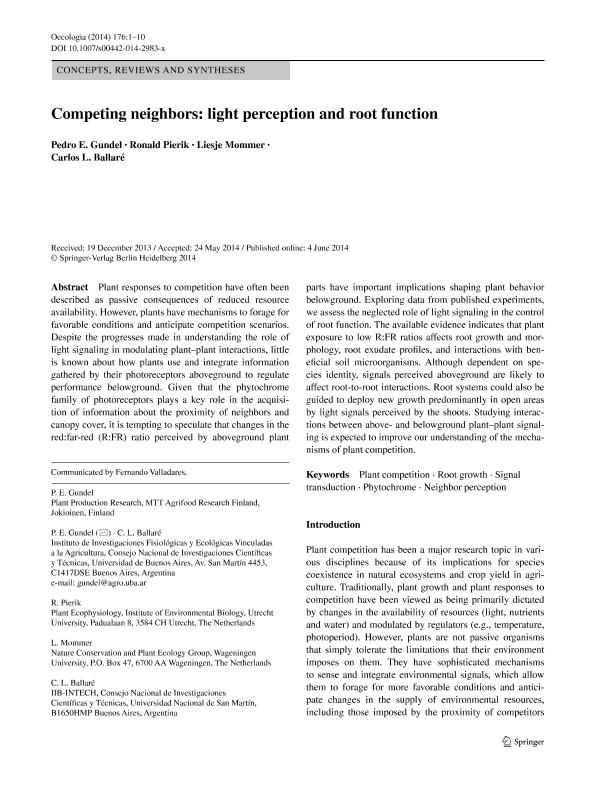Mostrar el registro sencillo del ítem
dc.contributor.author
Gundel, Pedro Emilio

dc.contributor.author
Pierik, Ronald
dc.contributor.author
Mommer, Liesje
dc.contributor.author
Ballare, Carlos Luis

dc.date.available
2016-02-16T19:59:03Z
dc.date.issued
2014-03
dc.identifier.citation
Gundel, Pedro Emilio; Pierik, Ronald; Mommer, Liesje; Ballare, Carlos Luis; Competing neighbors: light perception and root function; Springer; Oecologia; 176; 1; 3-2014; 1-10
dc.identifier.issn
0029-8549
dc.identifier.uri
http://hdl.handle.net/11336/4217
dc.description.abstract
Plant responses to competition have often been described as passive consequences of reduced resource availability. However, plants have mechanisms to forage for favorable conditions and anticipate competition scenarios. Despite the progresses made in understanding the role of light signaling in modulating plant–plant interactions, little is known about how plants use and integrate information gathered by their photoreceptors aboveground to regulate performance belowground. Given that the phytochrome family of photoreceptors plays a key role in the acquisition of information about the proximity of neighbors and canopy cover, it is tempting to speculate that changes in the red:far-red (R:FR) ratio perceived by aboveground plant parts have important implications shaping plant behavior belowground. Exploring data from published experiments, we assess the neglected role of light signaling in the control of root function. The available evidence indicates that plant exposure to low R:FR ratios affects root growth and morphology, root exudate profiles, and interactions with beneficial soil microorganisms. Although dependent on species identity, signals perceived aboveground are likely to affect root-to-root interactions. Root systems could also be guided to deploy new growth predominantly in open areas by light signals perceived by the shoots. Studying interactions between above- and belowground plant–plant signaling is expected to improve our understanding of the mechanisms of plant competition.
dc.format
application/pdf
dc.language.iso
eng
dc.publisher
Springer

dc.rights
info:eu-repo/semantics/openAccess
dc.rights.uri
https://creativecommons.org/licenses/by-nc-sa/2.5/ar/
dc.subject
Plant Competition
dc.subject
Root Growth
dc.subject
Signal Transduction
dc.subject
Phytochrome
dc.subject
Neighbor Perception
dc.subject.classification
Ecología

dc.subject.classification
Ciencias Biológicas

dc.subject.classification
CIENCIAS NATURALES Y EXACTAS

dc.title
Competing neighbors: light perception and root function
dc.type
info:eu-repo/semantics/article
dc.type
info:ar-repo/semantics/artículo
dc.type
info:eu-repo/semantics/publishedVersion
dc.date.updated
2016-03-30 10:35:44.97925-03
dc.journal.volume
176
dc.journal.number
1
dc.journal.pagination
1-10
dc.journal.pais
Alemania

dc.journal.ciudad
Berlin
dc.description.fil
Fil: Gundel, Pedro Emilio. MTT Agrifood Research Finland. Plant Production Research; Finlandia. Consejo Nacional de Investigaciones Científicas y Técnicas. Oficina de Coordinación Administrativa Parque Centenario. Instituto de Investigaciones Fisiológicas y Ecológicas Vinculadas a la Agricultura; Argentina
dc.description.fil
Fil: Pierik, Ronald. Utrecht University. Institute of Environmental Biology. Plant Ecophysiology; Países Bajos
dc.description.fil
Fil: Mommer, Liesje. Wageningen University. Nature Conservation and Plant Ecology Group; Países Bajos
dc.description.fil
Fil: Ballare, Carlos Luis. Consejo Nacional de Investigaciones Científicas y Técnicas. Oficina de Coordinación Administrativa Parque Centenario. Instituto de Investigaciones Fisiológicas y Ecológicas Vinculadas a la Agricultura; Argentina. Consejo Nacional de Investigaciones Científicas y Técnicas. Centro Científico Tecnológico La Plata. Instituto de Investigaciones Biotecnológicas - Instituto Tecnológico Chascomús. Instituto de Investigaciones Biotecnológicas (sede Chascomús); Argentina
dc.journal.title
Oecologia

dc.relation.alternativeid
info:eu-repo/semantics/altIdentifier/url/http://link.springer.com/article/10.1007%2Fs00442-014-2983-x
dc.relation.alternativeid
info:eu-repo/semantics/altIdentifier/url/http://dx.doi.org/10.1007/s00442-014-2983-x
dc.relation.alternativeid
info:eu-repo/semantics/altIdentifier/issn/0029-8549
Archivos asociados
